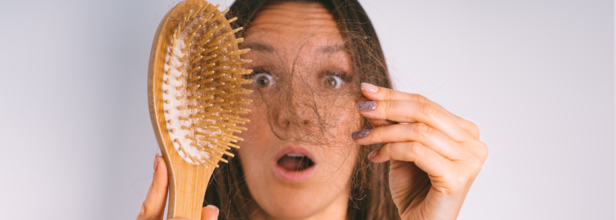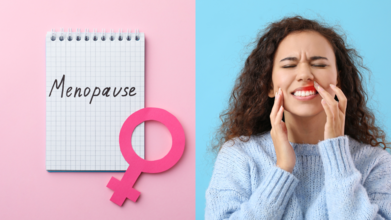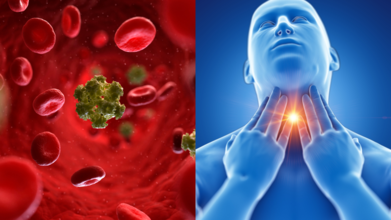- Health Conditions A-Z
- Health & Wellness
- Nutrition
- Fitness
- Health News
- Ayurveda
- Videos
- Medicine A-Z
- Parenting
- Web Stories
Hair Fall Myths Debunked: What Actually Works To Prevent Breakage

Image Credit: Canva
Everyone wants long, lustrous, and healthy hair. However, when it comes to the sheer volume of advice-from age-old remedies to modern tips-it's easy to get lost in myths, especially while trying to prevent breakage during humid seasons like monsoon or struggling to keep up with a nourishing haircare routine during the dull and dry hair in winter. Though it's natural to try hair care techniques to fight the effect of weather, not all advice is equal. In fact, some might even do more harm than good for your hair.
Here is an expert's guide to simply separate fact from social media "facts" and provide actionable tips to promote healthier hair, ensuring you know what really works and what doesn’t.
Your hair is not just strands; it's a form of self-expression. Through colors, cuts, and styles, it reveals personality, mood, or even major life transitions. This universality makes hair loss a sensitive topic that cuts across age, gender, and cultural lines. Yet, misconceptions abound. With an endless stream of online advice and opinions from well-meaning friends or family, distinguishing truth from myth can feel overwhelming.
Common Causes of Hair Loss
According to Dr. Akshay Batra, Trichologist, "hair loss is not strictly genetic"; it can result from several factors as stated by the doctor:
1. Hormonal Imbalance: An imbalance in hormones causes a condition such as androgenetic alopecia. Men experience a receding hairline, while women notice thinning at the crown. The only way to maintain hair health is by correcting these imbalances.
2. Nutritional Deficiency: There are nutrients such as iron, zinc, and vitamin B12 that are essential for hair. Research has shown that if these are lacking, it can weaken the hair roots, causing excessive shedding.
3. Scalp Infections: Dandruff, fungal infections, or eczema inflames the scalp, making it a hostile environment for hair growth.
4. Alopecia Areata: This autoimmune disease leads to patchy hair loss, mainly in the scalp, eyebrows, and beard.
Each of these causes points to a need to focus on root issues rather than superficial fixes.
Debunking Common Hair Myths
Myths about hair care often lead to misguided practices. Let's tackle some of the most prevalent ones:
Myth 1: Hair Oil Reduces Hair Fall
Fact: Hair oil moisturizes the scalp and reduces dryness, but doesn't prevent hair fall if the cause is an imbalance in hormones or nutritional deficiencies. Overuse can even make problems like dandruff worse.
Myth 2: Cutting Hair Promotes Growth
Fact: Hair growth is controlled by the health of the follicle, not by the length of the hair. Trimming can minimize split ends, which gives the appearance of healthier hair but does not affect growth rates.
Myth 3: Shampoo Can Prevent Hair Fall
Fact: Shampoos cleanse the scalp but cannot treat internal causes of hair loss. Choosing a gentle shampoo with a balanced pH can support scalp health, but expecting it to stop hair fall is unrealistic.
Myth 4: Biotin Alone Is a Cure-All
Fact: Biotin is just one of the several important nutrients for hair health. Hair loss can also be due to deficiencies in iron, zinc, or vitamin D, and no single supplement can be a silver bullet.
Myth 5: Lemon Juice Eliminates Dandruff
Fact: The acidity in lemon juice can cause irritation on sensitive scalps, making dandruff worse in some cases. Scalp care requires gentler, more balanced solutions.
Myth 6: Onion Juice Works for Everyone
Facts: Onion juice is highly prized for the presence of sulfur content, which is supposed to strengthen hair, though continued application irritates the scalp. This is very person-specific and condition-specific in terms of hair issues.
Can Homeopathy Give Hair Fall Long-Term Solutions?
While myths often claim a quick-fix solution, an enduring resolution is found by dealing with an internal imbalance. That's where homeopathy excels. Dr Akshay emphasises, "Homeopathy addresses the root cause of hair loss, which can be through hormonal imbalances, infection of the scalp, or stress."
- Customized Solution: Homeopathy is one of the few treatments for hair fall that will address issues based on each individual's specific trigger.
- Stress Management: Stress is a silent yet powerful contributor to hair loss. Homeopathic remedies like Ignatia and Natrum Mur not only alleviate stress but also promote emotional well-being.
- Improved Scalp Circulation: Certain homeopathic medicines enhance blood flow to hair follicles, nourishing them and encouraging regrowth.
- No Side Effects: Unlike harsh chemical treatments, homeopathy offers gentle solutions without adverse effects.
Practical Tips for Healthier Hair
Adding mindful practices to your daily life can complement homeopathic care and greatly improve hair health:
- Massage with Natural Oils: Coconut and argan oil are perfect for hydrating and nourishing the scalp.
- Choose the Right Products: Use sulfate-free shampoos and moisturizing conditioners that cause less damage.
- Avoid Heat Damage: Avoid using styling tools such as straighteners and curling irons.
- Be Gentle with Hairstyles: Tight ponytails or braids can stress hair, causing breakage.
- Eat a Balanced Diet: Foods rich in protein, iron, zinc, and vitamins (like leafy greens, nuts, and whole grains) bolster hair health.
Emotional well-being is critical to hair health. Undervalued stress can impact hormonal balance and lead to loss of hair. Taking the time for relaxation through activities such as yoga, meditation, or even a couple of minutes each day, can really make a difference. Healthy, resilient hair isn't the result of one miracle product or method; it's a culmination of smart choices, consistent care, and addressing root causes.
Hair strong, beautiful: it is not a sprint but a marathon. It's about finding out what works for you and sticking with it. Because your hair is unique like you are, it deserves to reflect the best self in the world.
Dr. Akshay Batra is a Trichologist and is an expert (B.H.M.S.) in Homeopathy at Dr. Batra's Clinic In India
Think Menopause Is All About Mood Swings and Hot Flushes? Your Bleeding Gums Might Tell a Different Story

When 49-year-old Angela Cook from Banbury started feeling sharp, throbbing pain in her gums, menopause was the last thing on her mind. A psychologist by profession, Angela found herself suddenly unable to get through her daily meals without discomfort. Her dentist suggested age could be the cause, but the real answer came unexpectedly through a radio segment. As she listened to someone discuss how menopause affects oral health, it clicked. Her gum pain wasn’t random; it was hormonal.
This little-known link between menopause and dental health is quietly catching many women off guard. The pain was unbearable, especially around her molars.
While Angela had been grappling with hot flushes and mood swings since her mid-forties, she hadn’t connected the dots. But hormonal shifts, particularly a dip in oestrogen, can wreak havoc far beyond what’s discussed in mainstream menopause conversations. Oestrogen plays a critical role in maintaining gum tissue and bone density; when levels fall, gums may become inflamed, bleed easily, and turn hypersensitive.
“....It wasn't until she accidentally caught a radio conversation about menopause affecting gum health that she had an epiphany – she was experiencing it," Express UK reported.
The Mouth Isn’t Exempt from Menopause
Despite menopause affecting half the population, oral health is rarely part of the public discourse. According to the NHS, fluctuating hormone levels can alter blood supply to gum tissue, making them more susceptible to disease. Dry mouth, burning sensations, and altered taste are also common complaints. Yet few women or even dentists routinely connect the dots.
Gums can respond just like skin to hormonal fluctuations, becoming more reactive and prone to inflammation. And unlike wrinkles or weight gain, gum issues are easier to dismiss or misattribute to poor dental hygiene.
Angela’s experience is far from isolated. A 2024 survey by CanesMeno found that more than half of menopausal women felt unprepared for what was to come, while nearly 48 per cent believed the general public needed better education about menopause. Perhaps more tellingly, a fifth of women still consider the topic taboo, and many avoid discussing their symptoms entirely.
Chewing on Solutions
In Angela’s case, what worked wasn’t a fancy dental treatment or prescription meds. It was something she stumbled upon online: gum massage.
She started gently rubbing underneath each tooth after flossing, once a day. She saw a difference immediately. She still gets the odd ache, but nowhere near what it was. It’s manageable.
Gum massage increases blood flow to the tissues and may help reduce inflammation, especially when combined with good oral hygiene. While it may not be a silver bullet for everyone, it’s a simple, low-cost strategy that made a tangible difference for Angela.
That said, if gum pain or bleeding becomes persistent, it’s crucial to consult a dentist to rule out periodontal disease, which can worsen with menopause but may require more intensive treatment.
Why the Silence?
Why are so many women in the dark about this? Partly because menopause education remains patchy and inconsistent. The CanesMeno survey highlighted that 35 per cent of women wished they’d learnt about it during their school or college years. There’s also the issue of fragmented healthcare. A GP might address hormonal concerns, while a dentist looks at your mouth; rarely do the two cross over.
Angela's story is a compelling reminder that menopause doesn't just mess with moods and body temperature; it can mess with your mouth too.
Time to Widen the Menopause Conversation
There’s a growing push for more holistic menopause care, one that includes gum health, joint pain, insomnia, and mental health, not just the headline symptoms. From workplaces to schools to healthcare settings, education needs to go beyond clichés and start equipping women with the full picture.
In an age where menopause is finally starting to get its due airtime, perhaps it’s time we listen to what women’s gums have been trying to say all along.
World Head and Neck Cancer Day: This Common Virus Is Now The Top Cause Of Oropharyngeal Cancer In Men

When we think of human papillomavirus (HPV), the first association that comes to mind is cervical cancer. That link is well established. But what most people don’t realise is that HPV has now quietly become the leading cause of a completely different and rapidly rising cancer—oropharyngeal cancer—particularly in men. These cancers, which fall under the broader umbrella of head and neck cancers, often strike parts like the tonsils and the base of the tongue.
On World Head and Neck Cancer Day, experts are ringing the alarm bells: it’s time we start talking about HPV in men with the same urgency that we do for women.
More Men, More Risk
According to a 2023 study published in The Lancet Oncology, HPV-related oropharyngeal cancers are now five times more common in men than women. “This isn’t just a medical statistic; it’s a warning signal,” says Dr. Akash Tiwari, Consultant, Oral and Maxillofacial Surgical Oncology. “We’re seeing a sharp increase in these cases, particularly in high-income countries, and the common link is persistent high-risk HPV infection.”
What’s making men so vulnerable? For starters, transmission. Oral HPV is most commonly passed during intimate skin-to-skin contact, especially through oral sex. Although most HPV infections clear up on their own, some high-risk strains like HPV-16 can hang around silently in the tissues of the throat and, over time, turn cancerous.
Why Men Struggle to Fight It Off
“Biologically, men are more likely to contract oral HPV and less likely to clear the infection,” explains Dr. Aarzoo Saliya, Consultant ENT, Head and Neck Onco Surgeon. “It may come down to immune differences, sexual behaviour patterns, or even lack of awareness.”
Unlike many infections that cause noticeable symptoms, oral HPV is sneaky. It often produces no signs, which means people can be completely unaware they’re carrying it or, worse, passing it on. And when symptoms do show up, they’re usually vague, making early diagnosis tough.
Symptoms You Should Watch For
HPV-related oropharyngeal cancer doesn’t always scream for attention. But if you’ve had any of these signs persistently, it might be time to get checked:
- A constant sore throat that just won’t quit
- Difficulty swallowing
- A lump or swelling in the neck
- Changes in your voice
- Unexplained ear pain
“These aren’t symptoms people usually rush to a doctor for,” says Dr. Tiwari. “But in the context of HPV-related oropharyngeal cancer, they’re red flags.” Unlike traditional tobacco- or alcohol-related oral cancers, HPV-related cases often don’t present with obvious visible lesions, which adds to the challenge.
Prevention Starts Early
The good news is that we can prevent it. The same HPV vaccine that’s widely recommended for cervical cancer prevention in girls works just as well to prevent the strains of HPV that cause oropharyngeal cancer.
“The most effective way to reduce risk is through timely vaccination,” says Dr. Saliya. “Ideally, the vaccine should be given before someone becomes sexually active; that’s why it’s recommended at ages 11 or 12 but can still be taken up to age 26 if missed earlier.”
Yet, in many places, the uptake of the HPV vaccine among boys remains painfully low, mostly because the risk in men hasn’t received the same attention.
Changing the Conversation Around HPV
There’s also a major need to shift public perception. “HPV isn’t just a ‘women’s issue’, and it certainly isn’t just about cervical cancer,” Dr. Tiwari stresses. “It’s a sexually transmitted virus that can affect everyone, and the consequences for men are becoming increasingly clear.”
That means raising awareness around safe sexual practices, routine screenings for those at risk, and greater openness about male HPV-related health risks. Men, particularly young adults, need to be part of the vaccination narrative.
Know the Risks, Take Action
On a day that spotlights head and neck cancers globally, the message is simple but urgent: HPV-related oropharyngeal cancer in men is real, rising, and largely preventable. Ignoring it isn’t just unwise; it’s dangerous. Whether you’re a parent considering the HPV vaccine for your son, a man experiencing persistent symptoms, or someone simply unaware of how far-reaching HPV’s impact can be, now’s the time to pay attention. Early action, education and vaccination can quite literally save lives.
Weight Loss Drugs For Dementia – Study Finds It May Prevent Cognitive As Well As Cardiovascular Issues

(Credit-Canva)
Weight loss drugs have become wildly popular in the recent years. However, even though they are popularly known as weight loss drugs they are actually used for a separate purpose, weight loss is just a side effect of the medication.
Medications like Ozempic and Zepbound, which are primarily used to treat type 2 diabetes and help with weight loss, are showing exciting new potential. They might also be helpful for a wider range of health conditions, from sleep apnea to chronic kidney disease.
Diabetes and Weight Loss Medicines
A recent study published in the JAMA Network Open suggests that these kinds of medications, known as GLP-1 receptor agonists, could offer important protection beyond their usual uses. For people who have both obesity and type 2 diabetes, these drugs might lower their risk of death and reduce the chances of developing two serious brain problems: dementia and a common type of stroke.
The findings suggest that GLP-1 drugs could do more than just control blood sugar, help with weight loss, and support heart health; they might also directly protect the brain and its blood vessels.
What the Research Discovered
Scientists had already hinted that GLP-1 drugs might help protect against dementia and stroke. However, there hadn't been many big studies specifically looking at how these drugs affect brain health, especially in people with a high risk, like those who have both type 2 diabetes and obesity.
To help answer these questions, researchers looked at seven years of health information from over 60,000 people. All of these individuals had both type 2 diabetes and obesity. Some of them were taking older diabetes medications, while others were prescribed GLP-1 drugs, like those found in popular medications.
After carefully checking the connections between the medicines and various brain conditions, the scientists found some significant things. People taking a GLP-1 drug had:
- A 37% lower chance of developing dementia.
- A 19% lower chance of having an ischemic stroke, which is the most common kind of stroke, caused by a blocked blood vessel in the brain.
- A 30% lower chance of dying from any cause.
The protection against dementia seemed even stronger for women over 60 and for those with a specific body mass index (BMI) range. An expert noted that people in this group have a particularly good chance to improve their brain health. It's important to know that these GLP-1 drugs did not seem to lower the risk of Parkinson's disease or another type of stroke called hemorrhagic stroke, which happens when there's bleeding in the brain.
Important Things to Consider
This study adds to the growing evidence that GLP-1 receptor agonists are very helpful tools, not just for losing weight and managing diabetes, but possibly for brain health and thinking abilities too.
However, it's really important to understand that this kind of study only shows a link, not that the drug directly causes the protection. It's possible that other things, like people's daily habits, could have played a role in the results, not just the medication itself.
Also, the researchers didn't collect detailed information like blood markers, genetic data, or brain scans. Having this kind of information could give much deeper insights into what's actually happening inside the body. The main researcher emphasized that these findings should be looked at carefully and need to be confirmed by more strict studies before doctors start making official recommendations based on them.
© 2024 Bennett, Coleman & Company Limited


